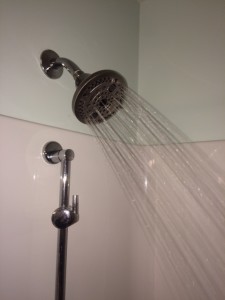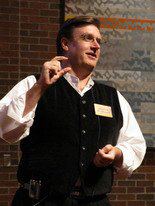 As I am still in the early phases of my writing career, I approached this year with goals that were as much about education as production. I did have specific writing milestones I wanted to achieve, but I also wanted to devote a decent percentage of my time and resources on learning as much as I could about the craft. I attended classes, took workshops (both online and off) and made as many contacts in the industry as I could. Like most new writers, I was looking for advice from every corner I could find.
As I am still in the early phases of my writing career, I approached this year with goals that were as much about education as production. I did have specific writing milestones I wanted to achieve, but I also wanted to devote a decent percentage of my time and resources on learning as much as I could about the craft. I attended classes, took workshops (both online and off) and made as many contacts in the industry as I could. Like most new writers, I was looking for advice from every corner I could find.
The most valuable thing I learned this year though was how to tailor all the advice and counsel into a form that worked inside my own life and methods. Different strokes, as they say. For me, the most important lesson was how to integrate the most common advice of all: write every day.
“Write every day” or some version of this is by far the most frequent recommendation I’ve seen, the one piece of counsel most writers seem to agree on. This was something I was aware of in 2014, and by the start of this year I was in already in the habit of sitting down at the keyboard at the same time every night and working through my two hours of blocked out time. Some nights I wrote little, sometimes I wrote a lot. For a while I became very focused on word counts, during the Spring I decided this was less useful than I had hoped.
As the year progressed, I started to look at this time differently – it stopped being writing time and started being typing time. When I entered my two-hour block with a solid idea of what I was there to do, the words would flow quickly and freely. When I tried to use the same time to work out my story’s problems and issues, all the while with hands on the keys and eyes on the screen, I could feel the momentum grind to a halt.
To work on the mechanics of my stories I needed not only a different environment but a different time. That time might come in smaller, harder to predict chunks, but it was there. In the car, at the grocery store or in the shower. I could spend that time thinking about my stories, and that was writing too.I discovered that, for me, writing was not only something I could do at other times of the day, often times it worked better.
To give a specific example, I’d like to dive briefly into a more detailed lesson I learned this year. This came courtesy of an online workshop taught by Dean Wesley Smith. (I found these workshops to be excellent – here’s a link. The relevant item to my story was the lesson that your character needs to have an opinion about the setting; omitting this will deny both the ability to resonate with the reader. As Dean often says in his lessons, I filed that “in the back of my writer brain” and moved on with my writing.
Fast forward to several months later. I was working on a new short story that I was quite passionate about. I had an interesting setting, a solid premise and what I felt was a really compelling main character. Unfortunately, when I ran the story by my writing group I got very consistent feedback: the readers could not connect with my main character. She was coming off as cold and distant, removed from the story somehow. I racked my brain trying to reason out why that was and eventually that voice from the back of my writer brain reminded me of Dean’s lesson. Taking a second pass at the story, I added her opinions about the setting and got the feedback I was looking for.
The important piece I want to stress here is not really how I solved this particular problem, but where. I didn’t solve that in front of my monitor, hands on the keys. I solved it in the shower, because when I take a shower, I always take it as a writer.
As I said above, I realized earlier this year that I have all my best ideas and breakthroughs when I am isolated. Taking a long walk by myself, driving to the store, or taking a shower. Thus I decided that when I am in those isolated situations, I will always think about my writing. This has allowed me to be mentally present when I am with my family or working my day job, while still getting maximum usage out of my typing time.
One of the most common statements I hear from folks in my position is “It’s hard to find time to write” and I almost agree. Balancing a job, a family, healthy living; all the demands of real life can be quite challenging. Sometimes you can only find a few minutes a day to type, but it can be easier to find time to write if you remove the requirement of a keyboard from the definition.
Just make sure you have a good hot water heater for those long showers.
About the Author: David Heyman
 Dave writes both novels and short stories in the various genres of speculative fiction. His other passions include his family, his job, gaming and reading about mountaineering. Sleep is added to the mix when needed. You can visit him at daveheyman.com
Dave writes both novels and short stories in the various genres of speculative fiction. His other passions include his family, his job, gaming and reading about mountaineering. Sleep is added to the mix when needed. You can visit him at daveheyman.com





